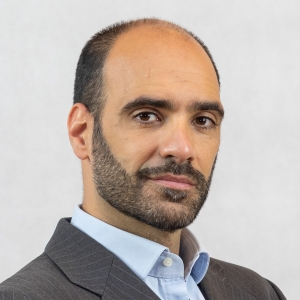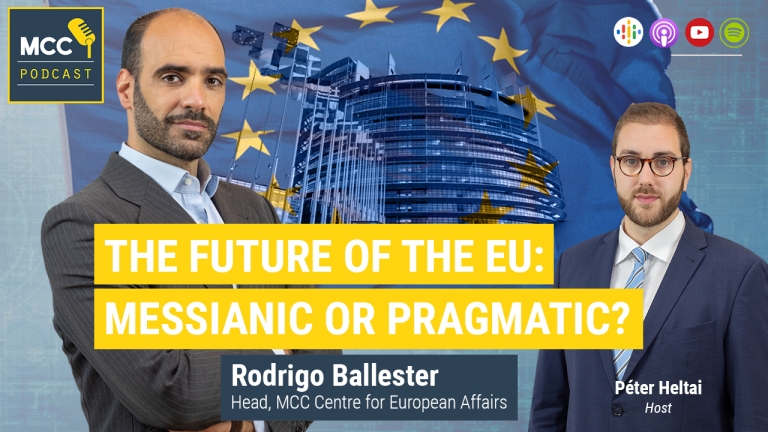Take the European Prime Minister of your choice and imagine for a minute that Deutsche Telekom decides unilaterally to cut his/her mobile connection. He/she then turns to Vodafone to get a new number but the latter refuses, and so do the main phone providers. Smaller operators seem ready to sign him/her but their products are banned from the main shops and platforms. Obviously, they belong to the same firms that boycotted the elected politician. Did the companies take this drastic decision following a court’s injunction? Did they cut off the line because the Prime Minister did not pay the bill? No, they did so on their own motion, simply because they found the Premier's opinion dangerous and immoral.
Now imagine for a second that every company providing essential utilities (electricity, transport, water supply, healthcare) decide who is worth receiving them and who is not, on political grounds, on their own motion, not upon the request of a public entity or without the green light of a judge. Imagine those companies do not only refuse to provide services to regular citizens but do so to the highest elected of the country. Imagine the Elysée Palace or the Berlaymont without power supply?
This is in a nutshell what the TAGAFAs (Twitter, Amazon, Apple, Google and Facebook, apologies for the dissonant acronym) did. President Trump’s behaviour nudging a grotesque crowd to march down the Capitol is despicable. Period. Yet, it would be too easy to stop here and overlook the gravity of the coordinated action taken by the TAGAFA’s to suspend Trump’s and thousands of his followers. Because, this is where the largest threat to democracy lies.
To start with, the TAGAFAs are not mavericks in their respective markets, quite the contrary. They hold dominant positions that some of them blithely abuse. That is why the competition watchdogs on both sides of the Atlantic keep an eye on them while trying to grasp all the implications of the revolution in the making brought by digitalisation.
The Commission just put on the table its awaited Digital Market Strategy (with specific rule for “gatekeepers”) while the American Federal Trade Commission sued Facebook on December 2020 for an illegal monopolization.
If we consider the services provided by the TAGAFAs as “essential facilities”, then pouding the state’s fist on the table would be most welcome. Should Apple's Store be given the same consideration as a railway or an electricity grid? Is access to Google comparable to drinkable water? In the digital era, most probably yes and in consequence what used to be a private business partly becomes a public facility and should be regulated accordingly. There is nothing new, the history of regulated capitalism is packed with successful enterprises whose dominant position became a threat and had to be dismantled.
Yet what is new and frankly problematic is the impact on fundamental rights, the rule of law and pluralism of this market power.
And we might be there already: on the world wide web, cutting the mic off is much more than infringing the terms of use, it is tantamount to private censorship at the largest possible scale.
Some might disagree. After all, every user agrees to play by the rules when downloading an app, don’t they? True, but a private contract does not and shall not prevail over constitutional rights, not even in Silicon Valley. Trump might challenge the bans in front of a court, but in a digital world where lightspeed is cruise-speed, being muzzled for months is tantamount to social and political death. And actually, this is irrelevant. The point is why Facebook, Twitter and co. play the sheriffs on their own initiative without a prior request from public authorities in their mailbox. When the TAGAFA’s unilaterally step over the core prerogatives of public authorities, democracies shiver. When, moreover, they do so erratically, clumsily, pushing a political agenda and bluntly applying double standards, democracies have good reasons to push the alarm button and defend themselves.

Photo: CNN
What is next, will the TAGAFAs also intervene in the mid-term elections, in US local campaigns, in the German in September, in any other European election? Or was it only a one shot treatment for Trump ? Will they now thoroughly screen all accounts that “incite to violence” in the same lousy manner? Will they monitor hate speech consistently according to their terms of use, or will they be consciously or unconsciously biased? Those questions are relevant as the former champions of “net neutrality” seem to take sides.
Twitter suspended end of January Iran’s supreme Guide’s account because he called for revenge against Trump. But open calls to delete Israel from the map is no reason to suspend his official account. The heads of state of four out of the five less democratic regimes on earth (according to the Economist 2019 Democracy Index) can tweet but the elected President of the US could not in the last days of his mandate. Just try to make sense of that.
Let’s continue. Thousands of Trump’s followers accounts are cancelled, while the account of the Muslim Brotherhood remains active. As a matter of fact, Twitter only suspended the Hezbollah and Hamas in 2019 after Members of the House pointed that those entities remained active on the platform even though both were on the State Department’s list of terrorist organisations.
In Europe, the big platforms’ record on terrorism is not any better. European authorities requested internet players (including the TAGAFA’s but not only) to do their share and quickly remove terrorist content signalled by public authorities. For years, the European Commission played the card of voluntary cooperation achieving promising yet unsatisfactory results. The Commission changed gears and proposed a legislation in 2018 and justified its decision stating that “In some cases, internet platforms have not engaged in voluntary efforts or did not take sufficiently robust action to reduce access to terrorist content online”. Citizens could expect terrorist content to be treated with the same zeal as Trump incendiary messages, but it is not always the case. Political views contrary are sometimes treated less favourably than illegal content flagged by authorities.
Trump’s case is not the exception that confirms an alleged rule of neutrality. It is quite the opposite, it is one more brick in the wall of an ideology that the TAGAFAs relentlessly promote and support through their terms of use and algorithms. If you need a bullet proof example please have a look at the chapter of Douglas Murray’s “Madness of Crowds” where he unmasks Google’s bias through a simple search on “white couples”.
This heavy politicisation is not a deviance neither a distortion, it is in Silicon Valley’s DNA, a place shaped by the culture of disruption and a messianism whose only boundary is the available state of the technological art. Improving the world is for losers, the real thing is breaking all barriers and create a brand new one. If technology allows it, why should not we go for it? Transhumanism, cyborgs, enhanced human beings is not science fiction, it is a project on which Google, for instance, is investing billions of dollars to make it happen under the guidance of its own mad scientist, Ray Kurzweil. A multi- speed humanity is emerging, and no one in Silicon Valley seems to even consider its disastrous effects. Change first, think after.
This blind faith comes together with an extremely shallow mindset that totally ignores the social consequences of technologies and a political culture that is closer to Star Wars than to Machiavel. The end result is an unbearable arrogance, a sense of moral supremacy sustained on a teenage, simplistic thinking whose only compass is to be or not to be on the “dark side of the force”. Moreover, Silicon Valley’s tycoons are the first victims of the virtual reality they promote through their social networks, one that alter their perception, keep them away from the ground and fuels their binary vision of human complexity. Indeed, like average “woke social warriors”, some might say. Except that Dorsey, Zuckerberg, Schmitt, Bezos, Cook and co. enjoy an unprecedented economic and political power and seem to lack the basic wisdom and prudence to employ it for worthy ends.
The TAGAFA’s strong hold actually goes far beyond market and politics; it affects people’s minds.
The more clicks, the more benefits; the more available brains are, the higher the shares. This addiction is so strong that pedagogues, neurologists (and the TAGAFAs themselves, at least their Corporate Social Responsibility departments) compare it to severe drug addictions. Hundreds of millions of persons (not only teenagers) are glued to their phone waiting for “likes”, seeking social blessing, exposing themselves, watching, compulsively checking posts, tweets and messages.
Even worse, screens and new technologies do shape our malleable brains and have unquestionable neurological effects (see for example this study on the “online brain"). IQ rates are dopping in developed countries and millions of persons suffer from dispersed attention while children exposed to screens at an early age suffer from cognitive and behavioural troubles. ICTs are to brain activity what the motor industry is on physical activity: a distortion of human nature and a pandemic of apathy that is growing into epic dimensions.

Photo: Haner/The New York Times
Hence, the TAGAFA’s s power is much more than an abuse of a dominant position on a given market. It is worse than an assault on fundamental freedoms and the rule of law. Those are companies with a daily grip on individuals, with the capacity to design an alternative reality for every user. This is an Hegemon led by sorcerer’s apprentices full of themselves with the messianic aspiration to reset the world based on an agenda that is a shallow as it is radical. Blinded in arrogance, they see themselves as a primus inter pares, as a self-proclaimed fifth power overlooking the other four.
At the shade of their ever-growing sway, we are walking down the road of digital serfdom, a path of submission that we tacitly accept while we foolishly post selfies with a duck face. The ultimate evidence of this submission disguised in narcissism is the relative indifference to President Trump’s bans from social networks. Some raised their voice, but many raised their thumps up and “liked” this decision in a vengeful manner. Their visceral hatred for Trump (indeed a very divisive and controversial personality) and his calamitous behaviour ahead of the Capitol Hill’s riot prevent them from taking a look at the global picture.
Trump’s case is iconic but he was not the first nor will he be the last to suffer the TAGAFA’s wrath and arbitrary practices. He is just the tip of a gigantic iceberg, an anecdote in a battlefield that largely transcends this particular situation. Lured by this episode, all those applauding now fail to see the magnitude of the threat.
What and who is the lead? Do we want to sail those waters preserving our democracies or are we ready to trade our rights for a couple of clicks to a trust of “illuminated” Big Techs? It was Trump yesterday, but who is next? Those clapping today and asking for more censorship might soon find their alias on the ever-growing list of cancelled accounts. There are countless examples already, let’s leave them for another piece.
The author is an expert of international law and Leader of MCC Center for European Affairs.
Cover Photo: NYT/Jialun Deng










